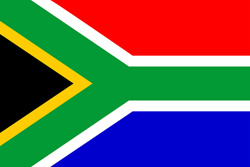South Africa has
one of the world’s largest HIV/AIDS epidemics, constituting 25 percent of total
cases in sub-Saharan Africa and 10 percent of cases worldwide. While
heterosexual intercourse as an HIV risk factor has received the most attention
in Africa, the epidemic of HIV among men who have sex with men (MSM) has not
received an appropriate focus. In two articles this month, amfAR grantee Dr.
Waimar Tun and colleagues at the Population Council in Washington, D.C, New York
City, and Johannesburg examine the potential impact of internalized homophobia
and HIV-related conspiracy beliefs on HIV/AIDS among MSM in South
Africa.
 In their
AIDS and Behavior
report, Tun and
associates note that MSM in Africa are 3.8 times more likely to be HIV-infected,
with homophobia and social discrimination preventing them from accessing
prevention and health care services. High levels of stigma and discrimination
exist in South Africa despite the fact that homosexuality is constitutionally
protected, unlike in many other African countries. MSM are considered
“un-African” and are commonly blamed for the spread of AIDS. This leads to an
“internalized homophobia,” a self-hatred and shame that MSM incorporate into
their belief systems, leading to internal conflicts and devaluation of self.
These men “feel different from others,” which sets up barriers to participation
in the gay community and access to general health services, thereby increasing
their vulnerability to HIV infection.
In their
AIDS and Behavior
report, Tun and
associates note that MSM in Africa are 3.8 times more likely to be HIV-infected,
with homophobia and social discrimination preventing them from accessing
prevention and health care services. High levels of stigma and discrimination
exist in South Africa despite the fact that homosexuality is constitutionally
protected, unlike in many other African countries. MSM are considered
“un-African” and are commonly blamed for the spread of AIDS. This leads to an
“internalized homophobia,” a self-hatred and shame that MSM incorporate into
their belief systems, leading to internal conflicts and devaluation of self.
These men “feel different from others,” which sets up barriers to participation
in the gay community and access to general health services, thereby increasing
their vulnerability to HIV infection.
“I have the feeling
that wanting to have sex with other men is a personal shortcoming of mine” is an
example of a statement from a nine-item scale that was frequently affirmed by
324 MSM in Tun’s study. Such responses were more common among the 42 percent of
participants who self-identified as bisexual as opposed to homosexual. These
answers were also more common among participants endorsing HIV-related
conspiracy beliefs, such as “people who take HIV medication are human guinea
pigs” or “HIV/AIDS is being used to kill black people.” Participants who
endorsed at least three of 12 conspiracy beliefs listed in the questionnaire
were 2.4 times more likely to hold a high level of internalized homophobia.
General misinformation about HIV was also strongly linked with internalized
homophobia.
In a second study,
published in AIDS
Care, Tun found that HIV
conspiracy beliefs are associated with inconsistent condom use and lack of
testing for HIV. MSM who were never tested were almost twice as likely to hold
such beliefs.
What might be done
to correct all of this? Tun and colleagues suggest that designing programs to
promote self-acceptance around gay identity by helping MSM to build a positive
sense of self will be crucial. And HIV educational programs need to better reach
MSM who are not “gay-identified.” “Ultimately,” they conclude, “this will lead
to improved HIV prevention program access and reduction in HIV
transmission.”
Jeffrey Laurence
is amfAR’s senior scientific consultant.